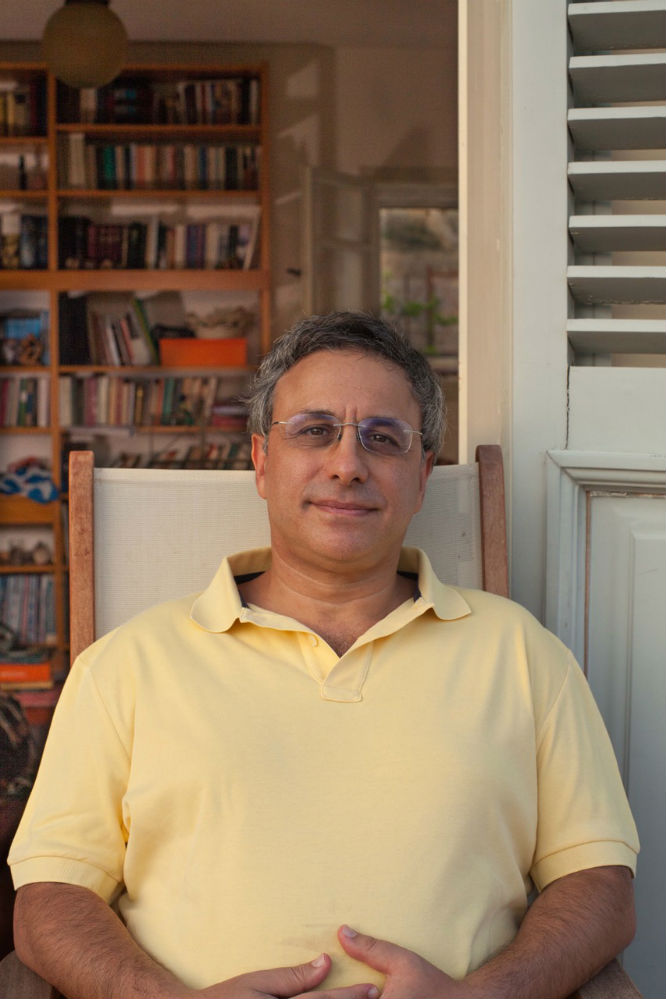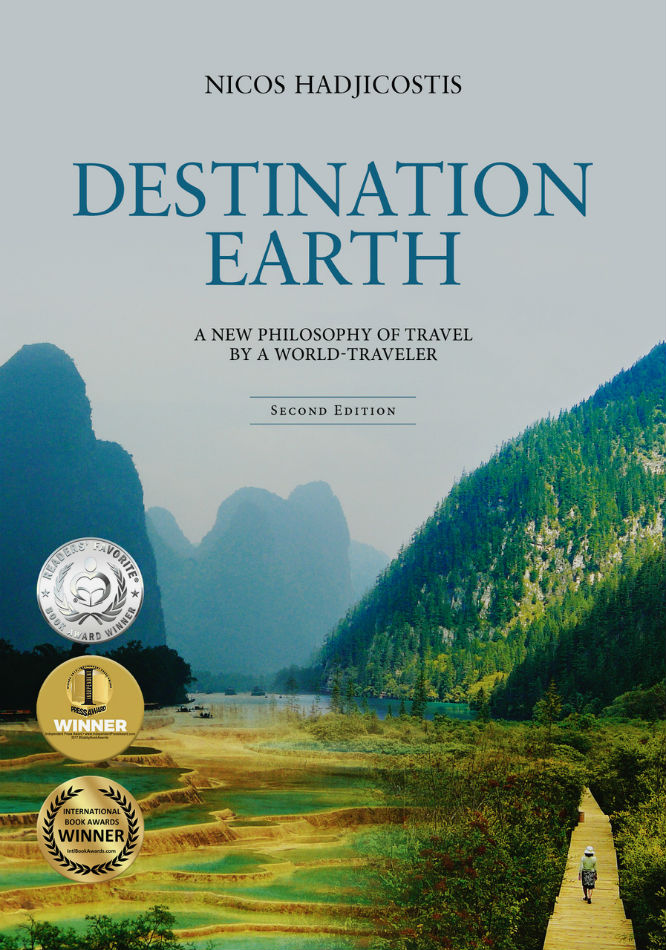
Is it safe for a woman to travel solo around the world? Absolutely, yes! There is nothing to fear. The world is safe. The world is friendly. Most people are helpful, kind, and hospitable.
Don’t I need to plan everything way ahead? Absolutely not! Everything you will ever need in your travels will be catered to by the people around you and by the world itself. The world is providing.
These are two of the central messages of my book, Destination Earth: A New Philosophy of Travel by a World-Traveller, which is the product of my continuous around the world journey that lasted for six and a half years, during which I travelled to seventy countries on six continents.
‘A Philosophy of Travel’ may sound strange. After all, what does philosophy have to do with travel? The simple answer is: everything!
Philosophy is not only a lofty endeavour reserved for people who think of abstract ideas all day. True philosophy has always been connected to human action. It relates to how we ought to think before we make decisions about matters big and small in our everyday life. Similarly, a philosophy of travel concerns itself with how we ought to view travel, how to develop the most appropriate and beneficial mindset when exploring other cultures and the world in general, and most importantly, how to act. Mindfully adopting a philosophy of travel will lead to deeper, more rewarding and fulfilling travels.
So where should such a philosophy start? Well, it should begin with ’why we travel in the first place.’ We travel to leave our comfort zones – the familiar and cherished. We travel in order to move towards the unknown and unimaginable, to expand and widen our knowledge, to open up to new ways of seeing. We travel to conquer our fears, insecurities, and prejudices. But we also travel to allow our imagination to face the sun after a long sleep. We want our soul to become free and unbound once again – alive, powerful, open to surprise.
And why and how does Travel help us achieve these things? As it turns out, travel is the Ultimate University. It offers the most condensed, wide-ranging, and deepest ‘courses’ in all fields of life. This is so because travel is the only university that brings together theory and practice, and harmonizes knowledge with life. Travel is also alive! Knowledge is obtained by and through immersion in the true living world. It also happens to be an open university: anyone is eligible to enter without applications, exams, or fees. The only thing preventing an individual from reaping the benefits is the decision not to enrol.
‘A journey of a thousand miles begins with a single step,’ said the Chinese sage Lao Tzu, thousands of years ago. One need only take the first step. Then the journey will unfold effortlessly by its own inherent power.
For example, I did no preparation (apart from reading a book or two) before my travels to the Dogon tribe in Mali – one of the highlights of my journey.
I found a local guide upon my arrival and planned which villages to visit after I started moving. In one village, I fell upon artists creating wooden sculptures with chisels and fire; in another, a woman was dyeing cloth with natural indigo, and everywhere I went I heard their beautiful songlike language. I was welcomed into their simple adobe homes adorned with colourful painted symbols, where they offered me beverages. These experiences were akin to completing a university’s diploma program: I experienced humanity’s past, the sights and sounds of a long-lost era, the foods and smells of another life, the feelings and touch of the people inhabiting this foreign universe. No books, no dry knowledge, no documentary could ever replace this living experience.
Of course, I’m not saying that one ought to start exploring the world by visiting remote and demanding destinations. Only that one must be fearless and be open to building upon her previous experiences.
But where should we begin, then? Well, if you haven’t already figured it out, we should begin by asking the right questions! Up to this moment, all I have done is ask relevant questions and try to formulate the proper answers. Travelling does the same: it cultivates the art of asking questions. This is also the function of philosophy. The article you are currently reading, although it doesn’t look it, is actually philosophical because I’m asking questions, thinking aloud about them, and trying to give answers. Similarly, the traveller is immersed in unknown worlds and often bears witness to many incidents for the first time that she will struggle to decipher. As a result, she begins to see everything with the wonder and inquisitiveness of a child. In the same way that a child incessantly asks questions to make sense of the world, the traveller too is immersed in a sea of questions that must be given voice to in order to make sense of her experiences.
For example: How can an arid desert exist near the lush rainforest of Peru? (It has to do with the specific microclimates of the region.)
How can live fish in tanks be sold in the farmers’ markets in the highlands of China if there is no river or sea nearby? (For 2,500 years, the Chinese have had aquafarming; they harvest all sorts of fish in their wet rice paddies!)
It is through such questions that the world’s needlework begins to unravel and reveal its secrets to the inquiring traveller. Just like a child trying to grasp the various threads of knowledge to comprehend their interconnectedness, the traveller continually weaves her new experiences into a constantly changing tapestry of the world.
OK, but there are so many countries and regions in the world. How many places should one visit and for how long? Determining how many places to visit depends on the overall length of the journey and at what Magnification (here meaning the measure of the depth with which one explores a place) the traveller wants to explore a country. For example, a three-week exploration of the USA is of a much lower magnification than a three-month exploration because the traveller’s experience and understanding during the former will pale in comparison to the latter.
Based on the level of Magnification, a Wise-Line is drawn: this is basically the travel route you will follow to experience the most characteristic cities, landscapes, sites, and cultures of the country. Ideally, the Wise-Line aims at cutting through a cross-section of the most representative aspects of a region.
And what’s the point of travelling longer and seeing things with a higher Magnification? A higher Magnification and a … wise Wise-Line leads to what I call the ‘Capturing of the Soul’ of a country. This, in my opinion, ought to be the ultimate aim of any traveller. It is the moment when travel becomes much more than visiting places and observing other cultures. It is that magical moment when you completely ‘get it’ and you feel in the core of your being what it means to be a member of another culture. Yet this capturing of the soul of a country cannot easily be explained and no set of actions can guarantee it. It can only ensue, it cannot be pursued.

The most a traveller can do is to totally immerse herself in the travel experience with the passion to relate to other cultures, as well as the proper mindset. Then, hope that a deeper experience of identity and wisdom will ensue.
But what is the proper mindset? There are many aspects to this, but the most important is to be ready to explore the whole of life. This includes all the difficulties and struggles that life presents. Critically, this includes how the traveller approaches these challenges and then uses
them for her benefit and growth. Travel is a reflection of life; it is not some magical activity that is free from obstacles. Difficulties appear on a daily basis and range in intensity. It could be an argument with a border patrol officer who is trying to use his power to extort money from you. Or being harassed by beggars. Whatever the situation, it is important to consider each challenge as a learning experience to better understand the culture and to strengthen your own psychological reserve.
I can hear you: ‘But this sounds like a lot of work! Isn’t traveling supposed to be something relaxing and pleasurable?’ Well, real travel is work. If you want to rest on a beach, that’s perfect; but this is called vacation. And everyone needs a vacation every once in a while – even travellers.
However, true travel is exploration infused by a deep desire to better understand the world and yourself. And as you travel more, you come to realize that you are actually on two journeys: one outer, one inner. The latter is none other than the transformative action of travel on your inner being. It is the lessons of this Ultimate University becoming one with the totality of your life. But this is another subject altogether, better left for another article...

Destination Earth: A New Philosophy of Travel by a World-Traveler is out now, RRP £17.99 paperback.

